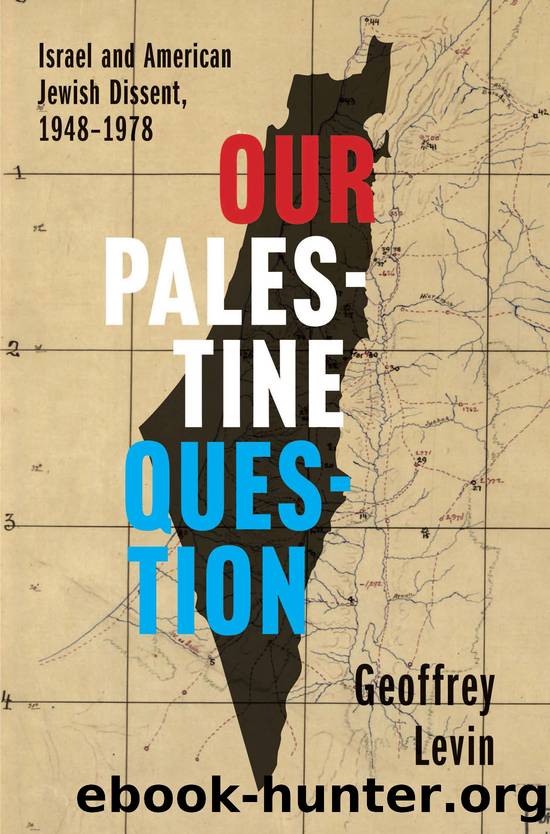Our Palestine Question by Geoffrey Levin

Author:Geoffrey Levin
Language: eng
Format: epub
ISBN: 9780300274998
Publisher: Yale University Press
Secretary of State John Foster Dulles on the left with Lessing Rosenwald, president of the anti-Zionist American Council for Judaism. Wisconsin State Historical Society.
Despite this dynamic, the Eisenhower administration was not entirely unfriendly to the State of Israel. Shortly after entering office, Eisenhower himself told Dulles that he felt âextremely hopeful that we can improve the political and economic position of Israel.â With regard to Israelâs economy, which struggled to absorb masses of immigrants in the early 1950s, Eisenhower certainly did work to strengthen Israelâs position. As historian David Tal has shown, Eisenhowerâs administration ultimately supplied Israel with a more generous economic aid package than had the Truman administration and provided it primarily in the form of grants, rather than loans as Truman did. Financial generosity, however, did not mean that the administration would follow Israelâs lead on political matters. The Eisenhower administration would chart its own course on Middle East policy, which sometimes involved direct pressure on Israel, putting it at odds with many in Congress whose views often reflected those of their pro-Israel constituents and various American Zionist groups. As for the White House, in place of Zionists, it would be the non-Zionists of the AJC and anti-Zionists of the Council who more frequently had the administrationâs ear.21
Eisenhowerâs first term marked the pinnacle of Council influence in Washington, aided by the administrationâs hopes of forging a partnership with Egypt, which it presumed required pressuring Israel to make concessions. In April 1953, Council president Lessing Rosenwald met with an âextremely attentiveâ President Eisenhower, who gave âthe impression that what he heard was in general agreement with his views.â The meeting may have contributed to the sentiments behind Eisenhowerâs October 1953 observation that âthe political pressure from the Zionists in the Arab-Israeli controversy is a minority pressure. My Jewish friends tell me that except for the Bronx and Brooklyn the great majority of the nationâs Jewish population is anti-Zion.â Secretary of State Dulles, on his first tour of the Middle East, reportedly took with him Council material that Rosenwald had given Eisenhower. Upon his return, Dullesâs speech calling for a more evenhanded U.S. policy toward the region âcontained passages that bore a striking resemblanceâ to Council proclamations.22
More frequent than direct Council contact with Eisenhower and Dulles was the groupâs communication with Henry Byroade, then the U.S. assistant secretary of state for Near Eastern, South Asian, and African affairs. Berger and Byroade quickly developed a warm friendship, coming to refer to each other affectionately as âHankâ and âthe mad rabbi.â Byroade had no qualms with making their personal relationship public. In late 1953, when confronted by Jewish Telegraphic Agency (JTA) journalists reporting that a âsecret luncheon meetingâ had taken place involving Rosenwald, Berger, and the assistant secretary, Byroade told prying reporters that âI merely met with some old friends whom I have known for a number of years.â Rosenwald remained tight-lipped about the luncheon, reporting that there was âabsolutely nothing for publication about the meeting today.â23
Yet as the reporters suspected, Byroadeâs relationship with Council leaders went beyond mere personal ties.
Download
This site does not store any files on its server. We only index and link to content provided by other sites. Please contact the content providers to delete copyright contents if any and email us, we'll remove relevant links or contents immediately.
| Bahrain | Egypt |
| Iran | Iraq |
| Israel & Palestine | Jordan |
| Kuwait | Lebanon |
| Oman | Qatar |
| Saudi Arabia | Syria |
| Turkey | United Arab Emirates |
| Yemen |
Empire of the Sikhs by Patwant Singh(23065)
The Wind in My Hair by Masih Alinejad(5084)
Rise and Kill First by Ronen Bergman(4766)
The Templars by Dan Jones(4676)
The Rape of Nanking by Iris Chang(4193)
12 Strong by Doug Stanton(3541)
Blood and Sand by Alex Von Tunzelmann(3184)
Babylon's Ark by Lawrence Anthony(2666)
The History of Jihad: From Muhammad to ISIS by Spencer Robert(2614)
No Room for Small Dreams by Shimon Peres(2356)
The Turkish Psychedelic Explosion by Daniel Spicer(2349)
Inside the Middle East by Avi Melamed(2347)
Gideon's Spies: The Secret History of the Mossad by Gordon Thomas(2329)
Arabs by Eugene Rogan(2291)
The First Muslim The Story of Muhammad by Lesley Hazleton(2257)
Come, Tell Me How You Live by Mallowan Agatha Christie(2244)
Bus on Jaffa Road by Mike Kelly(2144)
1453 by Roger Crowley(2018)
Kabul 1841-42: Battle Story by Edmund Yorke(2014)
